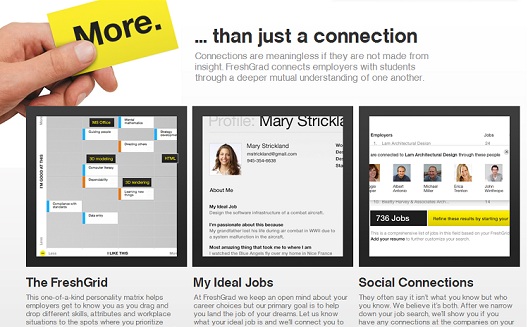Lebanese Entrepreneur Launches Data-Driven Career Matching Site

 Between newcomers like Nabbesh, tasmeemME,
Laimoon, and Wuzzuf, and veterans like Bayt and GulfTalent, the
Middle East has its fill of job search platforms. But what if
you're not even sure what you want to search for or what your best
skill sets are?
Between newcomers like Nabbesh, tasmeemME,
Laimoon, and Wuzzuf, and veterans like Bayt and GulfTalent, the
Middle East has its fill of job search platforms. But what if
you're not even sure what you want to search for or what your best
skill sets are?
New career-matching service FreshGrad has launched to solve
this problem in the U.S., offering career recommendations based on
an enormous database of aggregated data.
By analyzing users' resumes, interests, and assessments of their
own abilities, FreshGrad identifies skills, interests,
and experience and recommending certain career paths and specific
job postings.
Lebanese cofounder Roy Baladi launched the site in New York in
August, choosing to become an entrepreneur rather than take his
father's advice and find a job on Wall Street.
After working at Citigroup and feeling dissatisfied, he decided to help other college grads to find their career path, and co-founded the site for, well, fresh graduates, along with his brother-in-law, Yahia Hammoudi.
How It Works:
- First, you sign in through LinkedIn or Facebook, or create a
new username.
- Then you choose what career area you are interested in, enter
your major of study and highest degree earned.
Next, you are directed to the “FreshGrid” where 16 descriptive traits are chosen based on your previous responses, out of the 107 possible traits. You place these 16 traits on a graph, along the axes of “I like this” and “I’m good at this,” to reveal which you like and don't like and are most interested in. No traits can overlap, forcing you to pick some over others.
- The next page allows you to upload your resume and answer two questions: “What is your ideal job?” and “Why are you passionate about it?” FreshGrad pulls keywords from each of these fields and then recommends the top 10 career paths you would be interested in.

This is where the real fun begins. After FreshGrad suggests these 10 paths, users can click on each to see a summary of how many professionals are in that field, the expected growth in job availability, and average salaries. Below this information is a list of compiled job openings from the last 30 days in companies across the U.S. The site even shows you who from your LinkedIn or Facebook contacts are working in each of the fields, allowing you to take advantage of those connections.
Users also can click on a listing and are redirected to the specific company’s original application for that position.
The entire process is free for users, while FreshGrad makes money via a cost per click ad model, earning revenue when users click on affiliated partner sites. Eventually, they hope to accumulate a résumé bank and charge users to be featured, while also charging recruiters for access to preferred and relevant resumes.
Since its launch only 6 months ago, FreshGrad has grown to serve 1200 registered users and brought significant clients on board. Companies even use FreshGrad internally to identify hidden talent and interests among their staff, says Baladi.
Challenges & Future Plans
FreshGrad currently only has jobs posting
in the U.S., but they have aspirations to expand to Europe and the
rest of the world as they grow. The major challenge on this front
will be accumulating job posting data. Currently, FreshGrad’s
database relies on the U.S. Bureau of Labor Statistics and large
job data aggregators across the country. The majority of its users
are on the east coast of the U.S., mostly in the Greater New York
area.
To expand outside the U.S., they will need to find similar houses
of data to feed their platform, in countries where extensive labor
statistics may not be accessible.
“We’re a team of 5, so we rely on open
source libraries and partnership to integrate with our service,”
explains Baladi.
"Our unsung goal is for an international investor to be able to
hire U.S.-educated locals to travel abroad because the U.S. economy
isn’t growing that much, but the rest of the world is.” he
adds.
It's funded primarily by Lebanese angel
investors, friends, and family, however; the project has
secured nearly $900,000 to date. By not only connecting users to
jobs, but recommending a general career path, it differentiates
itself from standard job search sites like Monster.com.
I tested the platform myself and found a few bugs, but overall I
was impressed by the platform's layout and vision. One element that
could be useful to add is data on whether or not their service
has successfully placed an applicant in a job. Currently, FreshGrad
relies on self-reporting, but entries aren't verified. Hopefully
the team will find a way to systematize this. They've also
begun asking users to suggest new skills or career ideas, to
crowdsource its improvement.
I think FreshGrad will likely be a hit in the U.S., as many recent college grads are still without direction. The question is whether they will be able to expand to international markets, as Baladi hopes. Grads in the Middle East are also hungry for some advice and guidance in their job search beyond traditional career paths.


